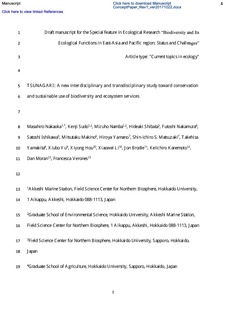| dc.contributor.author | Nakaoka, Masahiro | |
| dc.contributor.author | Sudo, Kenji | |
| dc.contributor.author | Namba, Mizuho | |
| dc.contributor.author | Shibata, Hideaki | |
| dc.contributor.author | Nakamura, Futoshi | |
| dc.contributor.author | Ishikawa, Satoshi | |
| dc.contributor.author | Makino, Mitsutaku | |
| dc.contributor.author | Yamano, Hiroya | |
| dc.contributor.author | Matsuzaki, Shin-ichiro S | |
| dc.contributor.author | Yamakita, Takehisa | |
| dc.contributor.author | Yu, Xiubo | |
| dc.contributor.author | Hou, Xiyong | |
| dc.contributor.author | Li, Xiaowei | |
| dc.contributor.author | Brodie, Jon | |
| dc.contributor.author | Kanemoto, Keiichiro | |
| dc.contributor.author | Moran, Daniel | |
| dc.contributor.author | Verones, Francesca | |
| dc.date.accessioned | 2019-04-01T08:57:09Z | |
| dc.date.available | 2019-04-01T08:57:09Z | |
| dc.date.created | 2018-01-16T13:57:34Z | |
| dc.date.issued | 2018 | |
| dc.identifier.citation | Ecological research. 2018, 33 (1), 35-49. | nb_NO |
| dc.identifier.issn | 0912-3814 | |
| dc.identifier.uri | http://hdl.handle.net/11250/2592633 | |
| dc.description.abstract | The expanding economical activities have accelerated losses of biodiversity and ecosystem services, which are especially pronounced in Asia. To find solutions to stop these losses, a group of scientists studying both ecological and social sciences has launched an interdisciplinary research network, entitled TSUNAGARI (Trans‐System, UNified Approach for Global and Regional Integration of social‐ecological study toward sustainable use of biodiversity and ecosystem services). The project is based on two main perspectives: (1) integrating different disciplines of environmental research across multiple spatial scales, and (2) evaluating the importance of ecosystem connectivity between land and ocean for biodiversity and ecosystem services. The integrative studies have been started as follows: (1) integrating global‐scale analyses of biodiversity and economy by developing GIS‐based footprint analysis, (2) establishing the link between the studies of local good practices of ecosystem management and life cycle assessment on ecosystem good and services, (3) linking local‐scale ecosystem studies to decision making processes for sustainable society by multiple stakeholders, and (4) upscaling local analyses of ecosystem processes to broad‐scale analyses of ecosystem patterns. The proposed approaches are considered effective to solve problems that impede conservation of biodiversity and sustainable use of multiple ecosystem services in various situations although we also find some gaps such as regional biases in biodiversity data and involvement of different types of stakeholders. By overcoming the major bottlenecks, we believe the new integrated approaches will promote conservation and sustainable management of biodiversity and ecosystem services research, and contribute to advance decision‐making processes from local communities to international levels. | nb_NO |
| dc.language.iso | eng | nb_NO |
| dc.publisher | Wiley | nb_NO |
| dc.title | TSUNAGARI: a new interdisciplinary and transdisciplinary study toward conservation and sustainable use of biodiversity and ecosystem services | nb_NO |
| dc.type | Journal article | nb_NO |
| dc.type | Peer reviewed | nb_NO |
| dc.description.version | acceptedVersion | nb_NO |
| dc.source.pagenumber | 35-49 | nb_NO |
| dc.source.volume | 33 | nb_NO |
| dc.source.journal | Ecological research | nb_NO |
| dc.source.issue | 1 | nb_NO |
| dc.identifier.doi | 10.1007/s11284-017-1534-4 | |
| dc.identifier.cristin | 1544240 | |
| dc.description.localcode | This is the peer reviewed version of an article, which has been published in final form at [http://dx.doi.org/10.1007/s11284-017-1534-4]. This article may be used for non-commercial purposes in accordance with Wiley Terms and Conditions for Self-Archiving. | nb_NO |
| cristin.unitcode | 194,64,25,0 | |
| cristin.unitname | Institutt for energi- og prosessteknikk | |
| cristin.ispublished | true | |
| cristin.fulltext | original | |
| cristin.fulltext | postprint | |
| cristin.qualitycode | 1 | |
